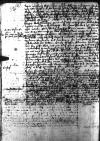Letter #3435
Ioannes DANTISCUS to Nikolaus FRIEDWALDHeilsberg (Lidzbark Warmiński), 1548-08-24
Manuscript sources:
Auxiliary sources:
| ||||||
Text & apparatus & commentaryPlain textText & commentaryText & apparatus
Unsernn freuntlichenn grus und alles guts zuvorann. Ersamer mannhafter her posunder gutter freundt.
Wir habenn gerne auf konin[g]liche commissio /
Ewer Erbarkeit bitte noch Ewrem
Datum aus unserm schloss
